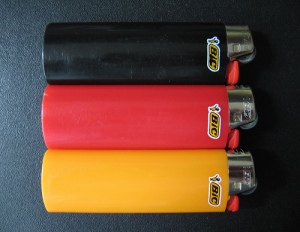
hoto Credit: Garyisajoke via Compfight cc
Don’t get me wrong, I’m not perfect. Fuck knows WHAT I am saying in German half the time, but I know that on at least one occasion I told people I went nude sledding instead of night sledding. The best thing about that language though, is that it’s so handily practical. If you don’t know the word for something, you can just describe it!
Don’t know what gloves are called? Just ask for hand-shoes (Handschuhe). Guess what? That’s the right word. Your gums are hurting? Just complain about your teeth meat (Zahnflesich), and you’ll be right on track. And your wrist is sprained? I think we both know you mean your hand-joint (Handgelenke) don’t you? Want to put something in your pocket? No. Actually, you want to put it in your trouser-bags (Hosentaschen).
So. While I go around murdering this lovely language, let me tell you the instant giveaways that you’re not a native English speaker. Just in case you were wondering.
“I’ve been here since ten minutes.”/ “I’ve lived here since two years.”
Nope. You’ve been here for ten minutes. Or else you’ve lived here since 2012. I don’t know why. No-one said English made sense. That’s just how it is. Deal.
“On the other hand side.”
There is no other hand side. There’s another hand. And there’s another side. Put them together and you’ve stepped through the looking glass.
“I need this until Friday.”
Actually, you need it by Friday. If you need it until Friday, that means you expect me to continually give it to you all the way to Friday. Which has come out sounding way dirtier than I meant it. You can say “You have until Friday to give it to me” but that sounds rather demanding and impolite.
“Let’s see how it looks like.”
We can see how it looks. Or we can see what it looks like. We cannot, unfortunately, do a combination of those things.
“This is the actual version.” “Could you please make this content more actual?”
Actual, in English, means real. Aktuell, in German, means current or up-to-date. So I can totally see where you’re coming from. But unless you’re speaking to someone who is familiar with this mistake, you’re going to be causing quite a bit of confusion.
That’s it! They’re the most common ones I ever hear.
Now, let me tell you about the time I went sledding…

Wow, I can’t think of a single scenario where nude sledding could possibly be enjoyable.
LikeLiked by 2 people
I would like to believe it’s not even a thing… But I think it might be!
LikeLike
Well, I can relate to all those ‘mistakes’ as English is not my native tongue. When I used to translate what I wanted to say, I literally came up with sentences like that. Made perfect sense to me at the time. What??? :))
LikeLiked by 1 person
I really love the quirks of speech people have when they are not native to a tongue. They will often explain things in a really creative way that gives me insight into how their language works. 🙂 So don’t ever lose those quirks. These are just things I often hear in a business context and they tend to grate after a while. I hear other native English speakers complaining about these ones, so I thought it might help to point them out.
LikeLike
In Yorkshire, the word “while” means “until”. So a neighbour said to me “I’ve only got another 5 years while I retire.” It’s taking me a while to understand this! Apparently they had to change all the road signs after a series of kerfuffles at level crossings where it said “Stop here while red light flashes.”
LikeLiked by 1 person
Amy that’s so weird! I would love to know why it came to be like that!
LikeLike